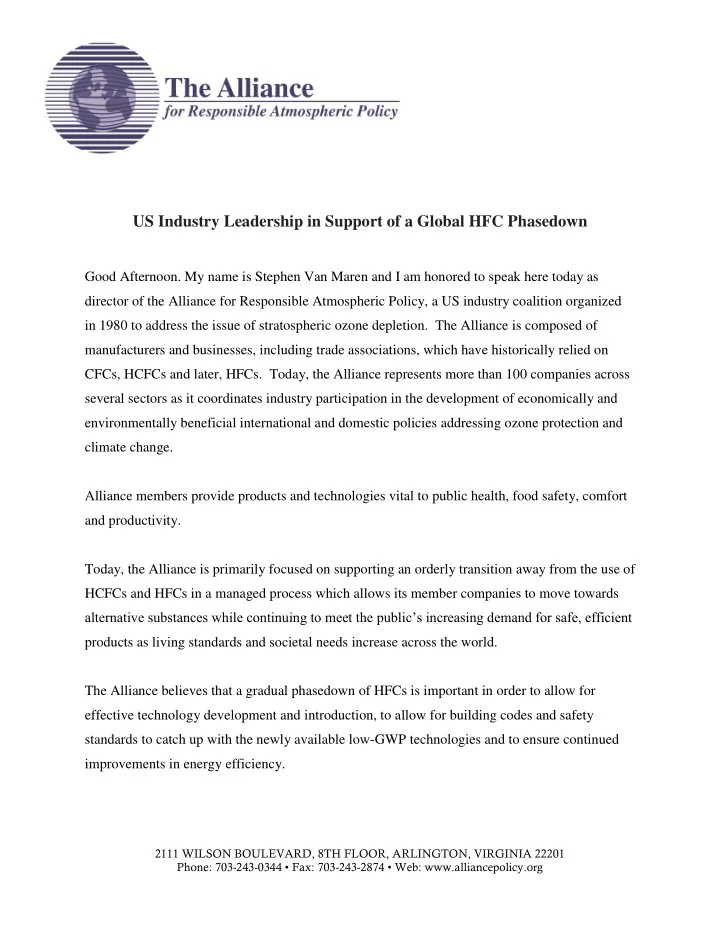

US Industry Leadership in Support of a Global HFC Phasedown Good Afternoon. My name is Stephen Van Maren and I am honored to speak here today as director of the Alliance for Responsible Atmospheric Policy, a US industry coalition organized in 1980 to address the issue of stratospheric ozone depletion. The Alliance is composed of manufacturers and businesses, including trade associations, which have historically relied on CFCs, HCFCs and later, HFCs. Today, the Alliance represents more than 100 companies across several sectors as it coordinates industry participation in the development of economically and environmentally beneficial international and domestic policies addressing ozone protection and climate change. Alliance members provide products and technologies vital to public health, food safety, comfort and productivity. Today, the Alliance is primarily focused on supporting an orderly transition away from the use of HCFCs and HFCs in a managed process which allows its member companies to move towards alternative substances while continuing to meet the public’s increasing demand for safe, efficient products as living standards and societal needs increase across the world. The Alliance believes that a gradual phasedown of HFCs is important in order to allow for effective technology development and introduction, to allow for building codes and safety standards to catch up with the newly available low-GWP technologies and to ensure continued improvements in energy efficiency. 2111 WILSON BOULEVARD, 8TH FLOOR, ARLINGTON, VIRGINIA 22201 Phone: 703-243- 0344 • Fax: 703 -243- 2874 • Web: www.alliancepolicy.org
As announced in February of this year, the Alliance supports the negotiation of such an amendment to the Montreal Protocol as the best means of achieving ozone and climate environmental objectives while considering performance, safety, energy efficiency, and technology availability. The complexities of an HFC phasedown require a unified, global approach. A growing consensus suggests that it is entirely feasible to manage the phasedown mechanism under the Montreal Protocol and reporting and accounting under the UNFCCC. Numerous precedents exist of concurrently addressing the same policy challenge under multiple international agreements. We believe the Montreal Protocol can replicate its ozone protection success with respect to greenhouse gas emissions if the body remains faithful to its past precedents, including active consideration of economic, technical and environmental feasibility. In July, the Alliance participated in an HFC management workshop hosted by the Ozone Secretariat in which the Alliance cited dramatic progress in the development of low-global warming potential (GWP) solutions for technologies that have relied on fluorocarbon compounds for valued societal products. Due to the complex nature of the technology transition desired, the transition process will likely require many years to complete. This long-term global phasedown can be assisted by a review process guided by practical technical review and complementary policies, including those promoting proper refrigerant management, or the prevention of emissions from leaks, one of the most promising immediate remedies. In September, participating in a roundtable briefing of White House officials by system manufacturers, end users, and fluorocarbon producers, the Alliance advocated a goal of reducing global HFC emissions by 80 percent by 2050 to be managed through a Montreal Protocol amendment and highlighted American industry efforts to develop the technologies to realize 2
those reductions. Alliance member companies are committing billions of dollars in research and development and commercialization of new technologies, while also continuing to improve energy efficiency performance. Later in September, at the UN Secretary- General’s Climate Summit, the Alliance had the privilege of presenting the four-point action plan of the Climate and Clean Air Coalition (CCAC) to reduce global HFC greenhouse gas emissions. The CCAC action plan consists of support for beginning negotiations in 2014 of an amendment to phase down the production and consumption of HFCs under the Montreal Protocol, the promotion of gradual public procurement of climate- friendly low-global warming potential alternatives to HFCs when feasible and support for private-sector organized efforts, including a Global Refrigerant Management Initiative on HFC emissions in servicing organized with Brazilian and US HVAC and refrigeration manufacturer associations and a Global Food Cold Chain Council to reduce HFC emissions and increase efficiency in the cold food supply chain. Our industry commitments must be paired with a global market-based phase-down mechanism. Fortunately, the needed institutions and mechanisms already exist in the Montreal Protocol, with a proven track record of achieving global technology transitions in economically sensitive way. Relying on these existing tools would provide a head start in tackling this challenge. The Alliance and our members are willing to take actions and support policies to meet our long- term goal in a manner that is both environmentally beneficial as well as economically informed. We are pleased to promote industry leadership to advance this important global effort. Thank you for the opportunity to address this challenge today. UNFCCC Technical Expert Meeting on Non-CO2 Greenhouse Gases Bonn October 22, 2014 3
Recommend
More recommend